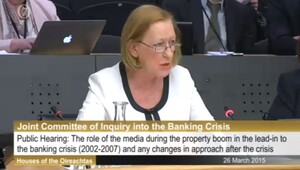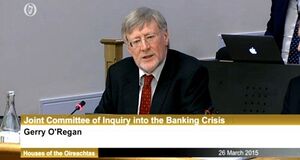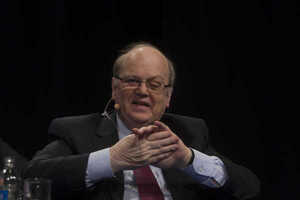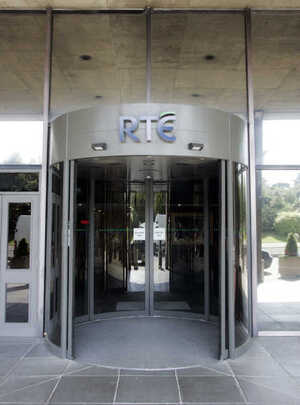 From top: Geraldine Kennedy; Gerry O’Regan; Dan O’Brien; Julien Mercille
From top: Geraldine Kennedy; Gerry O’Regan; Dan O’Brien; Julien Mercille
An inevitable thing happened at the banking inquiry.
Dr Mercille Writes:
Last week, the Banking Inquiry forced some members of the media to undergo questioning about their poor performance during the housing bubble years. They didn’t enjoy it.
The Inquiry’s media deliberations started with myself and [Dublin Institute of Technology journalism lecturer] Harry Browne, who provided a critical look at the media.
Then, a string of media individuals were called in to reassure everybody that what we said was garbage.
The media’s defence mostly has revolved around personal attacks and flimsy arguments. I don’t want to delve too much into the personal diatribes because it distracts from the important issues, but many are funny, so here is a short list of what I’ve been called:
-A “messiah” and “self-appointed guru”, and also “an obscure academic” (Gerry O’Regan, ex-editor of the Irish Independent).
-“The finest conspiracy theorist I have heard in a long time” (Geraldine Kennedy, ex-editor of the Irish Times).
-A “man of the hard left” (Dan O’Brien, a hard right-wing journalist)
-“I attach no credence whatsoever to Dr. Mercille and his views regarding the Irish Examiner. They are from a planet I neither recognise nor inhabit and they do not apply to the Irish Examiner” (Tim Vaughan, Irish Examiner editor).
-“Far left”, “not a media academic”, and has “never worked in the Irish media” (Michael Clifford, Irish Examiner journalist).
The real issues, however, are this: the Irish media has a record of failure over the last 15 years on reporting economic issues of the highest national significance.
It’s easy to see: news organisations missed the housing bubble in 2000-2007, and then from 2008 onwards, have argued that austerity is the best strategy out of the downturn, even though it actually worsens economic performance.
Therefore, if accountability was a value espoused by our media, a lot of journalists and editors should by now have been fired for incompetence.
A few responses to the (false) claims that have been made at the Inquiry and since then will clarify the role of the mass media during the housing bubble and since then.
-“Saying that the media conveys elite views is a conspiracy theory.”
A conspiracy happens when a few people plot in secret outside the normal institutional channels to accomplish something from which they benefit personally. This has nothing to do with my analysis of the media, which is an institutional one: the media give us the views of the elites because they’re owned and funded by elites. Nothing surprising in this.
-“Journalists just reported what the ‘experts’ said so they shouldn’t be blamed for missing the housing bubble.”
This is very interesting and is often heard from journalists attempting to absolve themselves of any blame. When you think about it, it is actually a very harsh indictment of the media.
Indeed, it implies that journalists don’t think and are not critical of anything: they only report what others say, like robots.
I recall a senior RTE journalist who said to me that he wasn’t to blame for missing the housing bubble because he wrote his articles in this way: “When I come back from lunch, I check my smartphone, and I’ve usually received about 12 press releases from companies and the government. I just copy them and that’s my article!” Great. Journalists are supposed to think and challenge viewpoints, not report them without question. Thankfully, some journalists still believe in those principles and apply them.
-“We really tried to find out but all the experts were telling us the economy was fine.”
For example, at the Inquiry, former Irish Independent editor Gerry O’Regan claimed that the Irish media had missed the boat on the banking crisis, but that “it was not for want of trying,” and that the state of the banking sector was “hidden from the view of everybody” at the time.
Really? In 2007, when Morgan Kelly wrote his newspaper article essentially predicting that the Irish banks would collapse, he first sent it to the Irish Independent, whose editor was Gerry O’Regan. What happened? The editor wrote to Kelly and told him his article was “offensive” and that he wouldn’t publish it.
-“Commercial interests don’t affect news content.”
Advertising revenues are crucial to today’s news industry. For example, at the height of the boom, 17% of the Irish Times’ revenues came from property advertising only, which means nearly €100 million over the period 2002-2006.
In any case, some journalists have already revealed in published academic research that they faced pressures not to attack the banking and property sectors during the housing bubble.
-Some, like Irish Examiner journalist Michael Clifford, say that “The notion of ‘the media’ as some homogenous beast that takes a line and follows it like a political party, for instance, is complete garbage.”
Yes, and that’s why nobody is saying that. The media reflect the range of opinion among elites. So there is diversity in the news, but it is relatively narrow.
-“If you can’t give examples of journalists who have been prevented from their editors or owners from challenging those in power, then you can’t say the media represses contrarian viewpoints.”
First, we have academic research that has reported on journalists who said they were leaned on not to criticise the housing bubble. But more broadly, the point is that those who work in the media, journalists and editors included, mostly agree with the values and principles of the organization they work for.
It’s the same in any institution: for example, if you’ve been a military officer for years, you probably believe in armed operations in world affairs, or at least you’re not too strongly opposed to that. Those who don’t assimilate their organisation’s values will most likely leave it or be forced to leave.
So most journalists won’t question or challenge elites, because they largely agree with them on the basics of policy. Sure, policy will be questioned in the details, but not fundamentally.
Therefore, when editors claim that they never came under pressure on the part of commercial interests or owners, in a sense, that’s probably true, because no pressure is needed to make them toe the line, with which they agree. (Of course, some journalists are very much aware of the pressures they face, so there are always exceptions).
-In his Sunday Independent article yesterday, Dan O’Brien [former Irish Times Economics Editor] insinuates that I overlooked a clear warning he supposedly gave to the nation on Prime Time in April 2006 about the housing bubble.
This is not at all true, and would mean that Dan O’Brien counts himself, together with David McWilliams and Morgan Kelly, as having warned us all about the bubble. But you don’t need to do any research to find out that O’Brien is wrong. In the same article, he says himself that he didn’t have a clue about the housing bubble until 2008:
“I did not see the size of the risks building up in the financial sector in Ireland and across the western world before 2008. I accept this was a failing and do not seek to distract from my culpability.”
But then he complains that I should have classified him as one of those who warned us about the impending crisis. Go figure. This is indeed reasoning from another planet.
@JulienMercille is lecturer at UCD and the author of The Political Economy and Media Coverage of the European Economic Crisis: The Case of Ireland (2015, Routledge). His new book, Europe’s Treasure Ireland, will be out in a few months.
Yesterday: Don’t Hate Him Because He’s Beautiful









It’s all pantomime. If there’s anyone who after the years since the bubble burst, that needs it actually explained to them, they’re gullible enough to believe this type of hand-wringing poo from govt and media alike.
That being said, fair play to Mssrs Browne and Mercille for swimming against the tide.
Jebus, Elaine Bryne is turning into a facsimile of Geraldine Kennedy. Has anyone seen them in the same room recently.
…I see Renua have announced some FF Councillor to run for them in Carlow…I was sure Elaine would declare for this…she may still but not with Lucretia.
Once again i’ll ask someone to justify the comment Mercille made last week:
“In fact, the current government crashed the economy by implementing austerity, which by now should be clear to all.”
This is economic gibberish. In what way has the economy “crashed” under the current government?
What he likely means is that austerity didn’t work, the economy didn’t grow because of austerity measures, it got worse, and the current growth cannot be put down to austerity either.
I believe that;s what he meant, which would be right.
There’s a bit of a difference between “austerity didn’t work” and “the current government crashed the economy with austerity”. The economy simply did not crash.
How about…… ‘impounded the crash’, or ‘worsened the crash’.
I’m sure you and Julien and everyone else knows that the austerity measures didn’t cause the crash… unless there was a time machine and someone went back and implemented them before hand. Splitting hairs, me thinks :)
Probably a wrong use of the word but the broader point remains true
owen c, austerity reduced disposable income which reduced spending which crashed the domestic economy. he’s correct in what he said.
Show me some data which suggests the domestic economy “crashed” during the period in office of the current government?
Exactly. A cut in budget spend of 3.5bn in an economy with 125bn GNP would be an “economic shock” in the academic sense…and implement that every year for 3 consecutive years where the backdrop is recession and you have real questions about debt sustainability.
You’re majoring in the minors. The assertion is that fiscal austerity prevented economic growth. Both this and the previous government pursued austerity policies.
The assertion is that austerity crashed the economy. I didn’t him force him to use the word ‘crashed’. Did someone else force him to use it? Is this where the conspiracy thing kicks in?
implementation of QE proves the point. more money in circulation = better economy. less money =…….
How’s about we take a look at the big picture and not let ourselves get distracted
Depends how you see it.
Austerity is how the government reacted to the massive economic clusterf*** that was 2008-10 and the years leading up too), if the economy in 2008 was a fire, austerity was petrol (granted Ireland as a small open export orientated economy could in effect ‘take’ austerity, much better than Greece, but again you never heard even that point being made), it was a way of cutting back on goverment expenditure so the state can better afford to pay-off debts it should never had acrewed in the first place, it has not helped, but exacerbated the core problem (just look up any chart that compares Euro (austerity) and US (no austerity) which is and always was DEBT, to the point we’re now told the solution (specifcally to mortage debt) is for house prices to rise, ie. more debt!
What Ireland experienced was the mother of all fixed-asset booms, made possible by stupidly cheap credit reckless lent out. you give banks loads of money they lend it out to make profit, whatever makes a return, who cares, you get bloat in housing, you get bloat in prices and wages, you get oodles of money pouring into inefficient uses, you get a fixed asset boom, which isn’t a boom at all, it’s just a collapse that’s late to the party. They try and fix it with austerity, they try and fix it with QE, they try every which way of dealing with the problem without tackling the problem itself, because the problem is them, namely the debt and who pays for it.
The Irish economy in the last few years is the biggest story in possibly the history of the state, a massive and total institutional failure, a world record-breaking cock up, the Irish media could have informed, it could have apologised, it could gave led, instead it stiffled and confused, it made it worse not better, it is of no use but to itself and it’s owners. Instead the Irish media must in turn be led, by Sunday Times over the GSOC bugging, twitter over the 800 dead bodies in Tuam and pantigate (an international story before it was a national one), the guardian over the sacking of Gemma O’Doherty. When international journalists came to Ireland they were shocked to see how little protest there was, to this day people still mindlessly parrot the line about ‘good people pay back their debts’ (which assumes every creditor is a saint, which would be lovely if it were true). When they do have a story that could blow the whole thing open they sit on it, sometimes for years (eg. The Anglo Tapes emerging not long after it became a politcal dead rubber post prom night) then pat themselves on the back, so hard it’s a wonder Beaker can still hold a microphone, if Chris Rock did a bit about Irish journalism he might say, “Irish journo’s be like “We’ve been very critical of the government policy.” you dumb journo f*** THAT’s WHAT YOUR SUPPOSED TO DO”. Something happened and the only thing the Irish media told us was how bad the Irish media is at telling us anything (there are exceptions of course, late debate on RTE radio is very good).
Austerity IS economic gibberish, more so it’s dangerous, as in ‘this is how we ended up with fascist distatorships in Europe’ dangerous.
https://www.youtube.com/watch?v=eHO3QlXvKTQ
…in fairness, Madam would know a good bit about conspiracy theories…
Poor Gerry. Owned.
Owned, distracted by his extra-curriculars, and not too much grey matter to begin with – not a great combination.
Its pretty ironic how the Irish media were guilty of groupthink during the boom & bust and are guilty again now of groupspeak when attacking Dr.Mercille for calling them out on it.
I don’t know of anyone who doesn’t think the media share a fair wedge of the blame for the property bubble. Sure, no-one put a gun to peoples heads to buy houses but it was their duty to inform and in that regard they failed abysmally. Even in 2008 when the dogs on the street knew the game was up we had the Sindo’s Brendan O’Connor telling us to rush out and buy a house because thats what the “ballsy” people were doing. In 2008 we had a Sindo article by their journalist Alison o’Riordan who was widely lambasted online for her moaning article about having paid €500,000 for a poky 2 bed apartment and a further €50,000 for a parking space. The Sindo journalists themselves were completely deluded and convinced that house prices could only go up. And when the tide went out and they were caught with their pants down they wrote articles telling everyone about soft landings and to put on the green jersey and buy more houses. Even when it was obvious how wrong they were they still couldn’t admit it and ‘fess up. They still can’t which is probably one of the main reasons why under 5% of Irish adults now buy a newspaper on a daily basis- our print media simply aren’t credible and they haven’t done anything to address that key fact.
O’Connor was right in some aspects. It is ballsy to go against the crowd and buy in a falling market. If he had of wrote that a few years later he might not have looked so bad.
pardon the snippy tone, and I’m not taking from your main point but when you type ‘he had of’ do you not think that it looks completely and utterly wrong?
It’s an acceptable written representation of a conversational voice. That is the voice I use in online discussion.
Accept away in written or conversation. But that still doesn’t take away from the fact that it sounds and looks and reads like someone who doesn’ idiot wrote it. You’re better than that :)
I’ll get me coat….
*facepalm*
Haha, you keep telling yourself that.
It’s moronic and makes no sense.
Watch out Ivan
He has a PhD and earns 150k a year!
Ha! This is the best application of Magic-Logic I’ve seen in a while!
That isn’t ironic at all.
@Bonkers
What makes you think a private company has a “duty” to inform?
Newspapers can write whatever they want – in order to benefit themselves financially.
If people are stupid enough to use newspapers to get the true reality of life, then that’s their own fault.
The issue here is that newspapers are trying to preserve the idea that they are completely honest and righteous.
i wonder if he’s single. and straight. prr.
There’d be nothing “hard left” about him eh, EH?
There’d be nothing left if you too got hold of him :)
Dan O’Brien is an insidious little kernel.
Then stop paying his salary (you do know the Department of Finance provides funding for the FG-biased Institute of International and European affairs, where Dannyboy is the economist in residence)
how does one go about doing that?
I love how he answers accusations with facts, its just a pity none of our journalists can do that.
Fair play on that !
I’m disappointed that Mick Clifford seems to have let himself down. I’ve always held him in high-ish regard.
Me too, also to a lesser extent Eoghan Murphy. I would of expected his line of questioning from Michael McGrath and the likes but Murphy had previously given the impression as a bit of a reformist, “outside the circle” type. Just proves every big party politician is a knob.
You ‘would of’ expected it would you??
That’s the way I do talk
That’s the way I talk to. I would of expected more of Mick Clifford as well. Something seems to have affected his attitude since before December.
+ 1 Bottom line seems to be that no one progresses in Irish journalism unless they’ve been touched with the lick-arse gene and are somewhat malleable. That’s why Harry Browne got the door in the Times, way too much independent thinking going on for their liking.
Spot on Buzz re Browne being booted from the Times – too much of a dangerous independent thinker.
A critical point is that the Irish Times paid €50 million to acquire a property selling website, and therefore inbuilt a heavily structured bias to pump the bubble even further – and concentrate in flogging houses rather than newspapers. Given the subsequent value crash of that asset and the fact that selling houses is not normally the prime purpose of a newspaper, were I an Irish Times journalist, I might wonder whether such activity amounted to reckless trading?
Bonkers is also 110% correct when they state ‘Its pretty ironic how the Irish media were guilty of groupthink during the boom & bust and are guilty again now of groupspeak when attacking Dr.Mercille for calling them out on it.’
The groupthink and propaganda operators of our print media now are actually far worse than during the bubble. Then the propaganda was to get everyone to buy property; now the propaganda is to tell everyone the economy is recovering.
Needless to say, the Irish economy will never recover as long as we are swamped by odious ECB debt to the effect of 120% of our GDP.
Yet arguably far more important is that society will never recover as long as we exist in an accountability vacuum – yet with the exception of Clifford, where are these brave journalists above in terms of pursuing those who caused – and in some cases, subsequently benefitted from – the National Collapse?
Inquisitive and investigative journalism has been creased out off Ireland’s media landscape in recent years – one has only to look at how then Minister McDowell used his office to shut down the Centre for Public Enquiry.
And yet these people expect us to have any belief or confidence in them? They’re a few days too early for April Fool’s…
so much of Irish media is slightly rehashed press releases and p.r. guff..
And that’s just the good stuff
The media lie. That’s their function.
Here’s an analysis of their latest work:
http://oireachtasretort.tumblr.com/post/115010265620/how-rte-became-recruiting-sergeants-for-water
Of course it’s all so predictable and actually quite hilarious in a grim kind of way. But of all the guff printed about him yesterday, the bit that actually alarmed me was the Examiner article which informed us that Mercille holds a Phd in ‘the political economy’. This strongly implies that the Examiner journalist doesn’t even know what political economy IS. If this is true, then I think we have an explanation right there of why Irish journalists weren’t able/willing to provide a critical analysis of our economic policies.
+1
Indeed. I think we need to get away from journalists who do an undergrad qualification in communications or journalism (or failed comedy) and get ones who do some kind of an undergrad in some area where they’re taught something other than how deadlines work and how to speak to camera. The technical stuff could easily be learned in a postgrad or even on the job, but it’s pretty clear that other than a completely misplaced arrogance, the current training of journalists achives poor results.
In any event, it was amusing to watch the spluttering of the Independent group whose coverage of the property market was rivalled in its craven admiration for the profits to be made only by their celebrations of the lifestyles of the property developers that passed as news in their papers. How, in fairness, can they argue that they were in any sense independent when they were reliant on the developers to buy advertising space and then provide what they liked to pass off as news stories? Making up half the published material in the Sunday Independent every week, without the bubble they’d have had nothing to pubish.
A communications or journalism course is probably one of the few places you will actually study the political economy of media. In any case, not many senior journalists back in the day would have held a qualification of this nature; they’re a relatively recent development.
*would of holden
Delightful little bit of Monday morning randomness there.
Did anyone notice the giant ad for DOB’s Beacon Medical group on the front page of the Sunday Business Post yesterday. That will have cost a pretty penny. This follows three weeks of near-the-bone reporting by Tom Lyons about Siteserv (twice) and DOB’s loans.
Can the struggling SBP resist DOB’s pennies?
Judging by the number of people I know who are boycotting the Beacon and Topaz, they’ll need a few auld ads to keep the wolf from the door.
As I said on the post yesterday:
https://www.broadsheet.ie/2015/03/29/dont-hate-him-because-hes-beautiful/#comment-1338583
Ha! Ha! Ha! Ha! Ha! Ha! Ha! Ha! Ha! Ha! Ha! Ha! Ha! Ha!
Hey, media people! Want proof of the media/property nexus at the height of the madness in 2007?
Sunday Tribune Business Editor Fired Following Pin Thread
http://www.thepropertypin.com/viewtopic.php?f=4&t=4500
Richard Delevan, Business Editor, got fired from the Sunday Tribune for talking out of class about an Estate Agent.
And what was the response of the media people?
*Tumbleweed*
Slightly off-topic but I read Roisin Ingle in Irish Times mag on Saturday – two glaring errors in one short piece. What parent could encourage their teens to read the newspaper when said newspaper can’t get the basics right. I don’t blame Ingle, someone should have read the piece before going to print.
this is a pretty damning indictment of someone who is supposed to be an academic
“Interested in analysing his evidence, I contacted Dr Mercille and asked him to share the database he had collated. It turned out that he had not gathered the data in the normal way that any rigorous academic would do, so that the findings could be replicated, tested and built on. As such, it is not possible for anyone to know what was included in his study and – probably more importantly – what was not included.”
I like what this Mercille guy has to say, but I would have thought he’d have responded to this criticism of his data instead of other bitchy comments etc..
maybe he has another book lined up or something?
Joe likes him, but he doesn’t like him… Thanks, Joe. You’ve completely changed my opinion of Mercille with your canny ‘I like him, but…’ tactic. Brilliant. Best boy in the class. I would of been proud had I come up with it meself.
Oh so you like him unquestioningly?
Good to know!
Mercille is right and those he criticises know it too.
Most Irish journos as are lazy shites. Just go to an event populated by them and you’ll see how little they care about writing good articles and how much more they care about their own egos.
They write about things like feminism to appear hard edged and probing but that’s a distraction from the fact they won’t write about Irish business scandals or corrupt politicians or gang crime.
Irish journos are a small little club of yes men and women. Pathetic.
From my experience Irish journalists are very lazy and follow the group. No one seems prepared to look at issues independently. Many are lead blindly by government spin. If you look at the media hype around property or the presidential election where Senator Norris was pilloried it was like watched a herd of sheep corralled by two strong collies..
Killer sheep with their own doggy militia?
Just a loada PR for his buke
I think Mick Clifford’s wrong where he resurrects the tropes about the guarantee being the only show in town, and the old reliable ‘we all partied’, but some of what he said about Mercille didn’t sound like criticism – “never worked in the Irish media” and “not a media academic” sounded like positives when he described Mercille. He certainly painted him as biased in the same article.
Those who want us to believe that they have no responsibilty for the property
bubble are the media themselves, they have a group think doctrine, it was
never us, well who gave it publicity, the inflated property supplements with
the coulour pictures and flowery language and they have just revived it again,
trying to buck up property values in the Dublin area….back at it again:
Perhaps, its time we had regulation of the amount that can be spent on
promoting property ,,,,just like we do with politicians, what the Dublin media
have inflicted on the ordinary people is worse than treason, in effect it has
being a form of silent subversion, which nearly up till now, has gone unoticed.
In effect who will trust them anymore, and in order to sell newspapers they are
having to rely on titalation as evidenced recently.
In fact the Public should leave their rags on the shelf….how much of the print run do they sell anymore.